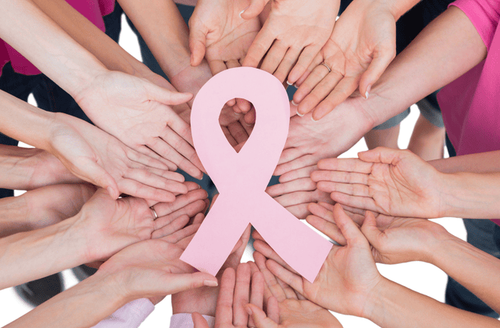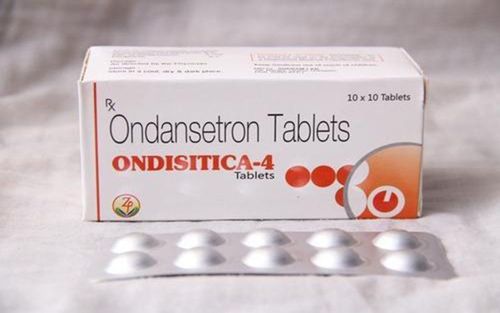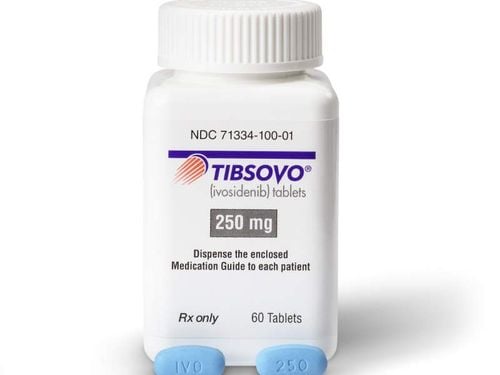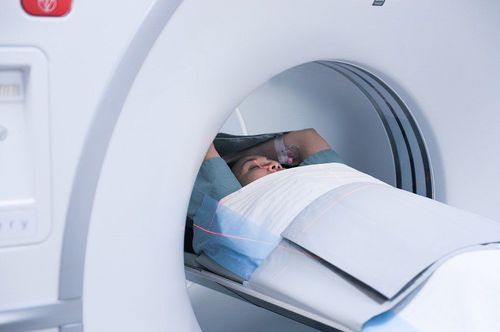This is an automatically translated article.
Pregnancy-related breast cancer (PABC) is defined as breast cancer diagnosed during pregnancy or in the first year postpartum. Breast cancer during pregnancy is a relatively rare event, and there is very little research on how to choose a good management and treatment for this condition. This article will present some recommendations for treatment, obstetric care, delivery management, and cancer surveillance.
1. Risk of breast cancer during pregnancy
While breast cancer is the most common cancer in women, breast cancer during pregnancy is a rare type of breast cancer and is thought to affect about one in 3,000 pregnant women. The incidence of breast cancer during pregnancy is increasing, especially in women over the age of 35.
With women delaying pregnancy until a later age, as is common in this modern society, the incidence of breast cancer during pregnancy is rapidly increasing. This has made it an important topic in education, discussion and research.
2. Is breast cancer treatment during pregnancy safe?

In case a woman is diagnosed with breast cancer during pregnancy, the treatment options are more complicated because everyone wants to choose the best treatment for the disease, while still responding conditions to protect both mother and baby. To choose the right treatment, oncologists, obstetricians, and neonatologists must work together to agree on the best treatment plan and duration of treatment. will proceed carefully and in detail.
The goals of cancer treatment during pregnancy are roughly the same as those for non-pregnant women, such as: treating cancer whenever possible or controlling and keeping tumors from growing. spread if not completely cured. However, in the process of treatment, concerns about the safety of the fetus make treatment more complicated and difficult.
Pregnant women can safely be treated for breast cancer, although the type of treatment prescribed by the doctor and the duration of treatment can affect pregnancy. Therefore, when a pregnant woman has breast cancer, doctors will make treatment recommendations depending on factors such as: The size of the tumor, the location of the tumor, how far the cancer has spread. , gestational age, mother's health status and finally the choice of pregnant women.
Surgical treatment for breast cancer is generally safe during pregnancy. Chemotherapy also seems to be safe for the baby if given while the baby is developing during the second and third trimesters of pregnancy. However, this method will not be safe for the baby when the baby is in the first trimester. Other breast cancer treatments such as hormone therapy, targeted therapy, radiation therapy... are more likely to harm the fetus and are generally not recommended during pregnancy.
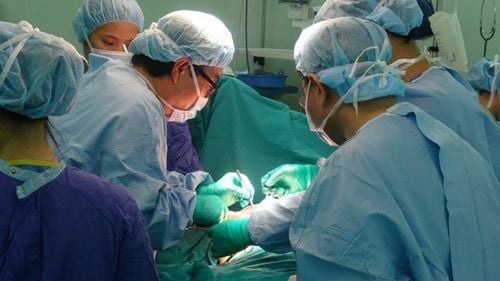
Breast cancer treatment options during pregnancy can also become complicated in cases of conflict between treatments that are thought to be best for the mother and the safety of the fetus. For example, if a woman is found to have breast cancer early in her pregnancy and needs chemotherapy right away, her doctor may consider ending the pregnancy with the woman.
Several previous studies have shown that therapeutic termination of pregnancy does not improve a woman's prognosis during pregnancy. Therefore, termination of pregnancy is not a recommended option when breast cancer is detected at this stage. However, this option is likely to be discussed and all other options considered, especially for invasive breast cancer conditions that can be treated immediately, such as inflammatory breast cancer. .
Trắc nghiệm: Những lầm tưởng và sự thật về ung thư vú
Ung thư vú có tỷ lệ tử vong cao nhất ở nữ giới khiến họ rất lo sợ bản thân mắc phải căn bệnh này. Tuy nhiên, không ít chị em có những hiểu biết thái quá về ung thư vú. Thử sức cùng bài trắc nghiệm sau sẽ giúp bạn loại bỏ được những nghi ngờ không đúng về căn bệnh này.
Bài dịch từ: webmd.com
3. Is anesthesia safe for breast cancer during pregnancy?
Breast cancer surgery during pregnancy usually poses little risk to the baby. But there are certain times during pregnancy when anesthesia can be dangerous for the baby.
Surgeons and anesthesiologists together with obstetricians need to work together and agree on a specific plan to determine the best time in pregnancy to perform surgery. If surgery is performed later in pregnancy, an obstetrician and neonatologist may need to be involved to address any issues related to the baby during surgery.
In addition, physicians should discuss and agree on the type of anesthetic used and which anesthetic technique is safest for both mother and baby.

4. Some breast cancer treatments during pregnancy
4.1. Surgery Surgical removal of breast cancer and lymph nodes is the mainstay of treatment for women with early-stage pregnancy breast cancer, and it is generally safe during pregnancy. .
Surgical options for breast cancer include: removal of the entire breast (total mastectomy), surgery to remove only the cancerous portion (tumor or BCS breast-conserving surgery).
Total mastectomy is used frequently for pregnant women with breast cancer. Because most women who preserve their breasts need radiation therapy afterward. Radiation therapy during pregnancy can adversely affect the fetus. Therefore, radiation therapy is not indicated until the baby is born. But delaying radiation therapy for too long can also increase the risk of breast cancer coming back.
In cases where breast cancer is detected during the third trimester, breast conservation may be an option. As it may be little or no delay in the use of radiation for treatment. Especially, chemotherapy will be linked to apply after surgery (in this case, radiation is usually given after chemotherapy is completed, but if breast cancer is detected early in pregnancy. There is often a delay in administering radiation therapy.For pregnant women in this situation, mastectomy may be a better option with breast conservation followed by radiation therapy.
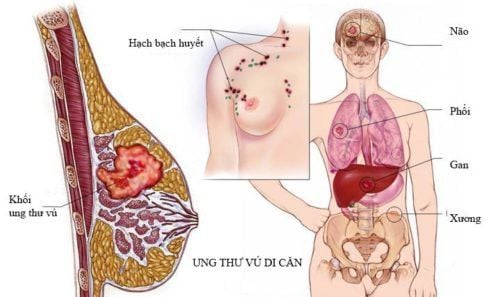
4.2 Lymph node biopsy In addition to the application of the method of removing the breast tumor, a biopsy of the axillary lymph node should also be performed. A sentinel lymph node biopsy may be a good option, but it depends on the length of the pregnancy and the stage of the cancer. This procedure uses mildly radioactive tracer and colored dyes to determine exactly where the nodes that contain cancer cells are located.
However, some experts in sentinel lymph node biopsy suggest that this should only be done after termination of pregnancy. Because, due to the effect of radioactive drugs and dyes, it can adversely affect the fetus.
4.3. Treatment after surgery Depending on the stage of breast cancer development, pregnant women need combination therapy with radiation therapy, chemotherapy or hormone therapy and or application of targeted therapy. This will reduce the risk of breast cancer recurrence. These methods may be considered adjunctive or in some specific cases treatment, but they will be indicated after delivery.
4.4. Chemotherapy Chemotherapy can be used after surgery (as an adjuvant) for some early stages of pregnant women with breast cancer. It can also be used for advanced breast cancer.
During the first 3 months of pregnancy, chemotherapy is not indicated to treat any condition. Because this is the period of formation and development of the fetus, it can also be a risk factor for miscarriage.
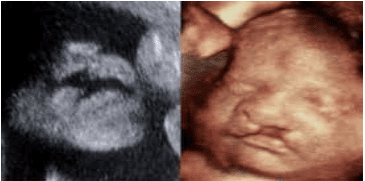
In the case of early breast cancer that requires chemotherapy after surgery, it will usually be delayed until at least the second trimester. If cancer is found in the third trimester, chemotherapy can be delayed until after delivery. Delivery a few weeks earlier for these women may be indicated under certain conditions.
Chemicals used for the procedure are generally not recommended after 35 weeks of pregnancy or within 3 weeks of delivery. Because, it can reduce the blood cell count of pregnant women. This can cause bleeding and increase the chance of infection during delivery. Delaying chemotherapy for several weeks before delivery can allow a woman's blood counts to return to normal before delivery.
Currently, with the rate of breast cancer increasing and the reproductive age increasing, we will probably face more cases of breast cancer during pregnancy. Understanding the current literature on breast cancer during pregnancy and its diagnostic and treatment limitations is imperative for all healthcare workers caring for women with this diagnosis. .
Breast cancer is a common cancer in women, it is estimated that every year around the world, many women die from this disease. Accordingly, if breast cancer is detected early, the prognosis for treatment is very high, even if it is completely cured and not recurred. Therefore, breast cancer screening is essential, especially for those at high risk of breast cancer.
Currently, Vinmec International General Hospital has been implementing a Breast Cancer Screening Package for women of different ages. At Vinmec, there is a full range of necessary medical equipment, a system of modern medical machines to perform methods of examination, diagnosis, testing, imaging, and treatment of breast cancer at many stages. . Accordingly, the breast cancer examination and treatment process at Vinmec is carried out by a team of highly qualified doctors and nurses who have undergone training and are technically certified, able to handle quickly and effectively. . Therefore, when using Vinmec's breast cancer screening and early detection package, customers can detect cancer even when there are no symptoms.
Please dial HOTLINE for more information or register for an appointment HERE. Download MyVinmec app to make appointments faster and to manage your bookings easily.
References: iconcancercentre.sg, ncbi.nlm.nih.gov



